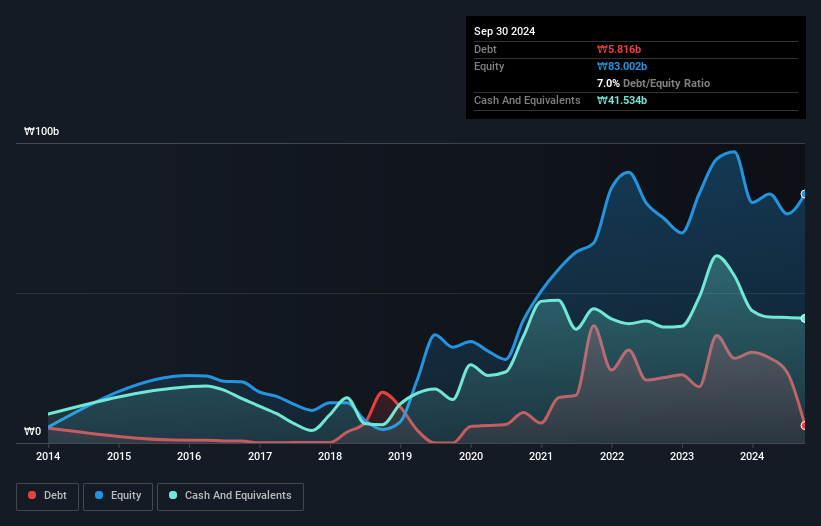Some say volatility, rather than debt, is the best way to think about risk as an investor, but Warren Buffett famously said that 'Volatility is far from synonymous with risk.' It's only natural to consider a company's balance sheet when you examine how risky it is, since debt is often involved when a business collapses. As with many other companies BENO TNR, Inc. (KOSDAQ:206400) makes use of debt. But the real question is whether this debt is making the company risky.
When Is Debt A Problem?
Generally speaking, debt only becomes a real problem when a company can't easily pay it off, either by raising capital or with its own cash flow. In the worst case scenario, a company can go bankrupt if it cannot pay its creditors. However, a more usual (but still expensive) situation is where a company must dilute shareholders at a cheap share price simply to get debt under control. Of course, debt can be an important tool in businesses, particularly capital heavy businesses. The first thing to do when considering how much debt a business uses is to look at its cash and debt together.
View our latest analysis for BENO TNR
How Much Debt Does BENO TNR Carry?
As you can see below, BENO TNR had ₩5.82b of debt at September 2024, down from ₩28.2b a year prior. However, it does have ₩41.5b in cash offsetting this, leading to net cash of ₩35.7b.

How Strong Is BENO TNR's Balance Sheet?
According to the last reported balance sheet, BENO TNR had liabilities of ₩10.3b due within 12 months, and liabilities of ₩2.31b due beyond 12 months. On the other hand, it had cash of ₩41.5b and ₩11.8b worth of receivables due within a year. So it actually has ₩40.7b more liquid assets than total liabilities.
This surplus liquidity suggests that BENO TNR's balance sheet could take a hit just as well as Homer Simpson's head can take a punch. With this in mind one could posit that its balance sheet means the company is able to handle some adversity. Succinctly put, BENO TNR boasts net cash, so it's fair to say it does not have a heavy debt load! The balance sheet is clearly the area to focus on when you are analysing debt. But it is BENO TNR's earnings that will influence how the balance sheet holds up in the future. So when considering debt, it's definitely worth looking at the earnings trend. Click here for an interactive snapshot.
In the last year BENO TNR wasn't profitable at an EBIT level, but managed to grow its revenue by 77%, to ₩24b. With any luck the company will be able to grow its way to profitability.
So How Risky Is BENO TNR?
By their very nature companies that are losing money are more risky than those with a long history of profitability. And in the last year BENO TNR had an earnings before interest and tax (EBIT) loss, truth be told. Indeed, in that time it burnt through ₩8.2b of cash and made a loss of ₩16b. While this does make the company a bit risky, it's important to remember it has net cash of ₩35.7b. That kitty means the company can keep spending for growth for at least two years, at current rates. With very solid revenue growth in the last year, BENO TNR may be on a path to profitability. By investing before those profits, shareholders take on more risk in the hope of bigger rewards. When analysing debt levels, the balance sheet is the obvious place to start. However, not all investment risk resides within the balance sheet - far from it. Be aware that BENO TNR is showing 4 warning signs in our investment analysis , and 1 of those shouldn't be ignored...
If you're interested in investing in businesses that can grow profits without the burden of debt, then check out this free list of growing businesses that have net cash on the balance sheet.
Valuation is complex, but we're here to simplify it.
Discover if BENO TNR might be undervalued or overvalued with our detailed analysis, featuring fair value estimates, potential risks, dividends, insider trades, and its financial condition.
Access Free AnalysisHave feedback on this article? Concerned about the content? Get in touch with us directly. Alternatively, email editorial-team (at) simplywallst.com.
This article by Simply Wall St is general in nature. We provide commentary based on historical data and analyst forecasts only using an unbiased methodology and our articles are not intended to be financial advice. It does not constitute a recommendation to buy or sell any stock, and does not take account of your objectives, or your financial situation. We aim to bring you long-term focused analysis driven by fundamental data. Note that our analysis may not factor in the latest price-sensitive company announcements or qualitative material. Simply Wall St has no position in any stocks mentioned.
About KOSDAQ:A206400
Flawless balance sheet with slight risk.
Market Insights
Community Narratives



